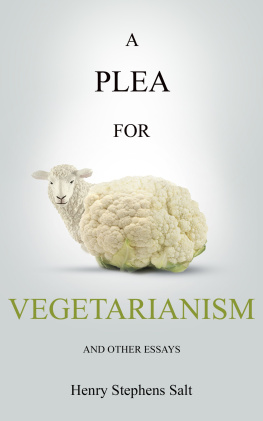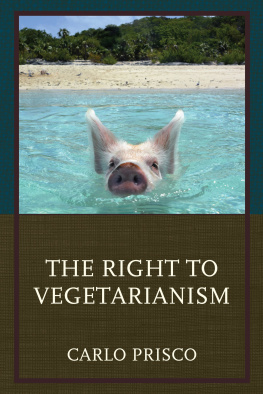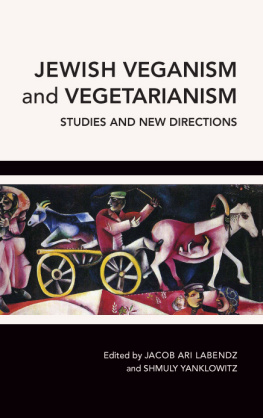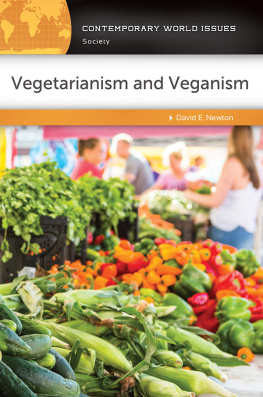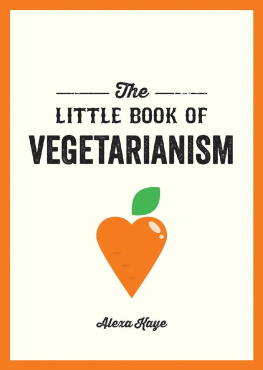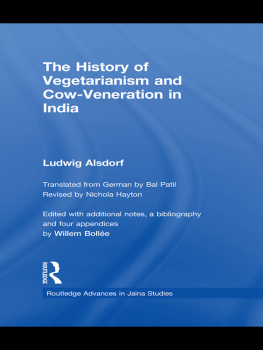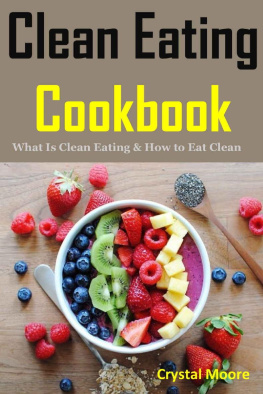A PLEA FOR VEGETARIANISM
AND OTHER ESSAYS
H. S. SALT
Published by Left of Brain Books

Copyright 2021 Left of Brain Books
ISBN 978-1-396-31833-7
eBook Edition
All rights reserved. No part of this publication may be reproduced, distributed, or transmitted in any form or by any means, including photocopying, recording, or other electronic or mechanical methods, without the prior written permission of the publisher, except in the case of brief quotations embodied in critical reviews and certain other noncommercial uses permitted by copyright law. Left of Brain Books is a division of Left of Brain Onboarding Pty Ltd.
Table of Contents
Prefatory Note.
Two of the following Essays, viz., Nos. I. and VI., are reprinted from Time for February, 1883, and January, 1886. The rest have appeared at different times in the pages of the Food Reform Magazine, the Dietetic Reformer, and the Vegetarian Societys Annual.
I have no doubt that it is a part of the destiny of the human race, in its gradual improvement, to leave off eating animals, as surely as the savage tribes have left off eating each other, when they came in contact with the more civilised.
H. D. THOREAU
A Plea for Vegetarianism.
I must preface this essay by the confession that I am myself a Vegetarian, and that I mean to say all the good I can of the principles of Vegetarianism. This is rather a formidable admission to, make, for a Vegetarian is still regarded, in ordinary society, as little better than a madman, and may consider himself lucky if he has no worse epithets applied to him than humanitarian, sentimentalist, crotchet-monger, fanatic, and the like. A man who leaves off eating flesh will soon find that his friends and acquaintances look on him with strange and wondering eyes; his life is invested with a mysterious interest; his death is an event which is regarded as by no means distant or improbable. Some of his friends, who take a graver view of such dietetic vagaries, feel it to be their duty to warn him boldly and explicitly that he will undoubtedly die in a short time unless he amends his ways. Others content themselves with the more cautious assertion that he is undermining his health by slow degrees, and will inevitably fall a victim to the first severe attack of illness that may befall him. Others, again, are of opinion that though his bodily health may not suffer, yet his mental powers will be sapped by a fleshless diet, and he will soon sink into a state of hopeless idiocy and imbecility. On the other hand, there are some who readily admit the possibility of living without meat, but profess themselves, with a pitying smile of superior intelligence, utterly unable to imagine any reason for such abstinence.
In spite of these somewhat discouraging reflections, I think it will be worth our while to inquire if there be really such great absurdity in the idea of not eating flesh, or if it be possible that the Vegetarians have reason on their side, and that the present movement in favour of a reformed diet may contain the germ of an important change. However that may be, it can do no harm to my readers if they hear what can be said in favour of Vegetarianism; then, if they are not persuaded to adopt a fleshless diet, they will have a clear conscience, and be able to enjoy their beef and mutton all the more afterwards.
The first and most obvious advantage of a vegetarian diet is its economy. Flesh-meat is so much more expensive than cereals and vegetable products, that it must be accounted very extravagant and unbusinesslike to use it as a common article of food, unless, as is generally believed, its superior quality compensates in the long run for its dearness. But if Vegetarians find that they live in perfect health without meat, would they not be somewhat deficient in common-sense if they did not make the most of their pecuniary advantage? The humanitarians, sentimentalists, crotchet-mongers, and fanatics have therefore, at least, one point in their favourthe cost of their food is far less than that of the shrewd flesh-eater. I mention this point first as being the most plain and indisputable, not necessarily the most important; yet that it is also of great importance will scarcely be denied, in a country whose food supply is yearly becoming a matter of greater difficulty, and where thousands of people are in a state of abject poverty and want. Even in well-to-do households the price of meat is a source of constant complaint and vexation to the prudent housewife; yet she would laugh to scorn the bare idea of living without flesh, and, if she has ever thought of Vegetarianism, has thought of it only as an impious absurdity and dangerous hallucination of modern times, to be classed with Mormonism, Spiritualism, Anglo-Israelism, Socialism, and possibly Atheism itself. What sort of a religion must that be? was the remark of an old and faithful servant when she heard that her former master had become a Vegetariana remark typical of the attitude of society towards the Vegetarian movement.
Secondly: Is it not equally unquestionable that it is both more humane, and what, for want of a comprehensive word, I must call more sthetic, not to slaughter animals for food, unless it be really necessary to do so? If it can be shown that men can live equally well without flesh-food, or, rather, unless it can be shown that the contrary is the case (for the burden of proof must always rest with those who take on themselves the responsibility of wholesale slaughter), it must surely seem unjustifiable, on the score of humanity, to breed and kill animals for merely culinary purposes.
Cteris paribus, there is therefore a moral advantage in a vegetarian diet; and the humanitarians and sentimentalists are only fulfilling a real duty in abstaining from animal food, if experience has shown it to be in their case unnecessary. And, if we assume for a moment that a fleshless diet is practicable, how cruel to animals, and how degrading to men, is the institution of the slaughter-house! Having no wish to dwell on what is morbid and unpleasant, I shall not pain the feelings of my readers by harping on the sufferings which their victims undergo, but shall content myself with remarking that those good people are mistaken who imagine that the slaughter of animals is painless and merciful. A society has lately been instituted (not by Vegetarians) with the object of introducing into our slaughter-houses more humane and sanitary methods of procedure. The mere existence of such a society is a proof that the system is not free from cruelty; but if anyone wishes for further proof, he has only to read, if he has nerve enough to do so, the account which the society has published of the present system of slaughtering.
But, as I said before, the practice of flesh-eating is not only cruel towards animals, but degrading to mento those, at least, who have eyes to see, and ears to hear, the teaching of morality and good taste. A truly sthetic eye would surely be shocked by the horrible display of carcases with which our butchers are wont to bedeck their shops; and it is indeed a strange predilection that induces even ladies to go in person to the market to buy their butchers meat, as that article is euphemistically entitled, and to ask anxiously the important question, when was it killed? A truly sthetic ear would hardly be charmed by the lowing of cattle and bleating of sheep when they are driven hurriedly down our streets by an individual dressed in blue. A truly sthetic palate and a truly sthetic nose (if there be stheticism in these senses) could hardly relish the flavour of meat, however artfully mitigated and concealed by the skill of the cook. The greatest and most unerring argument in favour of Vegetarianism is, to my mind, the utter absence of good taste in flesh-eating, which is revolting to all the higher instincts of the human mind. Methinks at meals some odd thoughts might intrude, says Byron; and if they do not intrude in most cases, it is only another proof of the wellnigh insuperable power of custom and prejudice.
Next page
